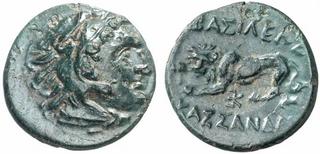Related Research Articles
This article concerns the period 319 BC – 310 BC.

This article concerns the period 309 BC – 300 BC.
Year 312 BC was a year of the pre-Julian Roman calendar. At the time, it was known as the Year of the Consulship of Corvus and Mus. The denomination 312 BC for this year has been used since the early medieval period, when the Anno Domini calendar era became the prevalent method in Europe for naming years.
Year 310 BC was a year of the pre-Julian Roman calendar. At the time, it was known as the Year of the Consulship of Rullianus and Censorinus. The denomination 310 BC for this year has been used since the early medieval period, when the Anno Domini calendar era became the prevalent method in Europe for naming years.
Year 314 BC was a year of the pre-Julian Roman calendar. At the time, it was known as the Year of the Consulship of Libo and Longus. The denomination 314 BC for this year has been used since the early medieval period, when the Anno Domini calendar era became the prevalent method in Europe for naming years.
Year 315 BC was a year of the pre-Julian Roman calendar. At the time, it was known as the Year of the Consulship of Cursor and Philo. The denomination 315 BC for this year has been used since the early medieval period, when the Anno Domini calendar era became the prevalent method in Europe for naming years.
Year 319 BC was a year of the pre-Julian Roman calendar. At the time, it was known as the Year of the Consulship of Cursor and Cerretanus. The denomination 319 BC for this year has been used since the early medieval period, when the Anno Domini calendar era became the prevalent method in Europe for naming years.
Year 317 BC was a year of the pre-Julian Roman calendar. At the time, it was known as the Year of the Consulship of Brutus and Barbula. The denomination 317 BC for this year has been used since the early medieval period, when the Anno Domini calendar era became the prevalent method in Europe for naming years.
Year 316 BC was a year of the pre-Julian Roman calendar. At the time, it was known as the Year of the Consulship of Rutilus and Laenas. The denomination 316 BC for this year has been used since the early medieval period, when the Anno Domini calendar era became the prevalent method in Europe for naming years.
Year 313 BC was a year of the pre-Julian Roman calendar. At the time, it was known as the Year of the Consulship of Cursor and Brutus. The denomination 313 BC for this year has been used since the early medieval period, when the Anno Domini calendar era became the prevalent method in Europe for naming years.
Year 311 BC was a year of the pre-Julian Roman calendar. At the time, it was known as the Year of the Consulship of Brutus and Barbula. The denomination 311 BC for this year has been used since the early medieval period, when the Anno Domini calendar era became the prevalent method in Europe for naming years.
Year 308 BC was a year of the pre-Julian Roman calendar. At the time, it was known as the Year of the Consulship of Mus and Rullianus. The denomination 308 BC for this year has been used since the early medieval period, when the Anno Domini calendar era became the prevalent method in Europe for naming years.
Year 306 BC was a year of the pre-Julian Roman calendar. At the time, it was known as the Year of the Consulship of Tremulus and Arvina. The denomination 306 BC for this year has been used since the early medieval period, when the Anno Domini calendar era became the prevalent method in Europe for naming years.

Antigonus I Monophthalmus was a Macedonian Greek general and successor of Alexander the Great. A prominent military leader in Alexander's army, he went on to control large parts of Alexander's former empire. He assumed the title of basileus (king) in 306 BC and reigned until his death. He was the founder of the Antigonid dynasty, which ruled over Macedonia until its conquest by the Roman Republic in 168 BC.

Cassander was king of the Ancient Greek kingdom of Macedonia from 305 BC until 297 BC, and de facto ruler of southern Greece from 317 BC until his death.

Alexander IV, sometimes erroneously called Aegus in modern times, was the son of Alexander the Great and Princess Roxana of Bactria.

The Wars of the Diadochi or Wars of Alexander's Successors were a series of conflicts fought between the generals of Alexander the Great, known as the Diadochi, over who would rule his empire following his death. The fighting occurred between 322 and 281 BC.
Polyperchon, was a Macedonian Greek general who served both Philip II and Alexander the Great and then played an active role in the ensuing battles for control between Alexander's generals.
Ptolemaeus or Ptolemy was a nephew and general of Antigonus I Monophthalmus, one of the Successors of Alexander the Great. His father was also called Ptolemy and was a brother of Antigonus. Ptolemy, the nephew, was Antigonus's right-hand-man until his son Demetrius took on a more prominent role.
The Second War of the Diadochi was the conflict between the coalition of Polyperchon, Olympias and Eumenes and the coalition of Cassander, Antigonus, Ptolemy and Lysimachus following the death of Cassander's father, Antipater.